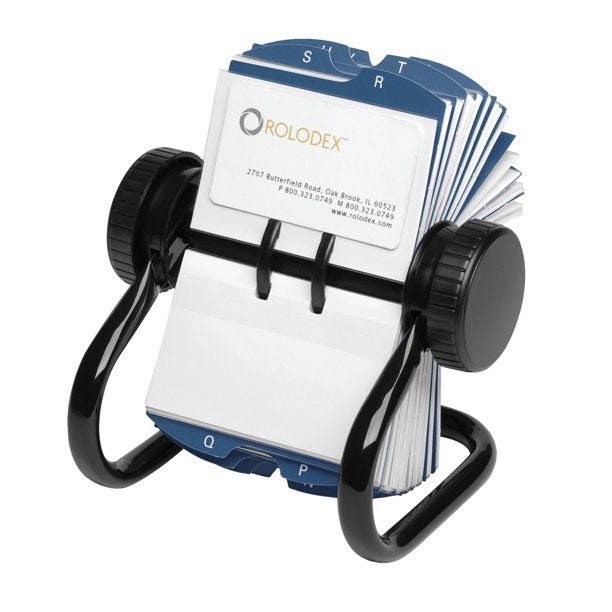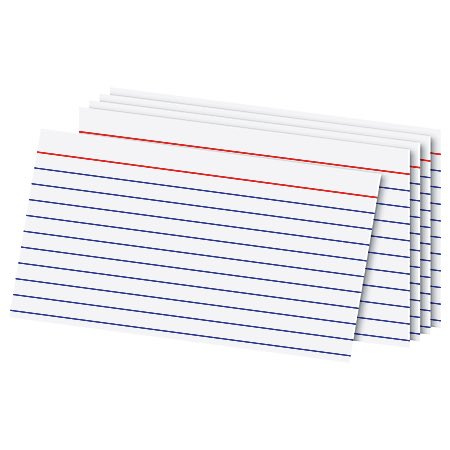My last job before becoming an entrepreneur was working for a high-flying real estate kook that made a big pile of dough in the 80s, lost a bigger pile by the early 90s, and made a monster pile by the late 90s.
His desk was littered with Rolodexes (a business artifact unknown to readers from the smartphone generation). The Rolodexes were small desktop wheels that held, in alphabetical order, his world-class collection of contact information. To him the Rolodexes were like portable trophy rooms, storing his conquests, but instead of taxidermy they held business cards.
Each card had a story, and sometimes he’d get nostalgic and start going through them:
“Look at this Michael Eisner one, you know we met for lunch once at The Ivy.”
or
“See this, this David Stern one - look how they did the NBA logo”
My job entailed spending many hours sitting on the other side of his big desk. I’d get called in to be questioned about some project but mid-questioning he’d take phone calls and pace around the room talking into his headset, stopping to dust off his Citation X model - a toy-sized replica of an airplane he part-owned.
If I moved to get up he’d wave me back down and so I would wait, listening to half of a conversation, flipping through the Rolodexes to kill time. One day, while he was on a call and I was trapped, he fished through his pockets pulling everything out and placing it on the desk and I saw an “index card” (another prehistoric relic for many readers).
The index card was folded in half and inside was taped a quarter (photo reference below for those in the post-Apple Pay crowd).
After he finished the call (there were lots of false starts to our conversations because, hearing only one side of his conversation, I would mistake a pause for the end of his call) I asked him what was up with the quarter.
He said “I keep this because if everything goes to shit, it’s all I need”.
(Quarters could be used to make phone calls in things called pay phones back then).
I learned over time that quarter had a mystical importance to him - it was more than some sort of a lucky charm; it was a stoic representation and reminder of his entrepreneurial fortitude. No matter what might happen, all he needed to get back on top - he believed - was that quarter and his Rolodexes.
We lost touch after I quit but I heard the Great Financial Crisis squeezed him hard - he’d gone big on residential lot development and in turn lost his interest in the beloved airplane.
I wasn’t surprised, though, when I ran in to him a couple of years ago in New York and he was back on top - bigger than ever.
I came to realize that, like a periodic financial fast, he found value in losing close to everything. He liked pushing the chips in, and if he won, he won big. And if he lost, well, he’d done it before and he’d use his secret weapon Rolodexes for the comeback. He thrived on the journey, brinksmanship that would take him back to a life of fat bank accounts and private aviation.
I was glad to see him and thankful, only in retrospect, of my time working for him. I learned quite a bit, much of it about how not to behave.
He seemed happy and a bit manic again, talking fast about his most recent caper - something to do with building cell towers. But he had aged and I wondered how many climbs back up he had in him in case the cell tower idea didn’t pan out.
I knew he couldn’t help himself and, like an addict pulling the slot machine with the long ash of a cigarette hanging from his lip, he’d keep going. He had to. We both knew he couldn’t comply - even if he wanted to - but I told him to chill with the risk taking, if for no other reason than because pay phones were now impossible to find.








Sounds familiar, and why one of my core money scripts is putting up guardrails to secure your most important needs when you achieve some financial security, and don't get out of control on spending. A luxury tried usually becomes the new bare minimum baseline, for your kids too.
Whenever I see you posted something, I stop whatever I’m doing to read your post.